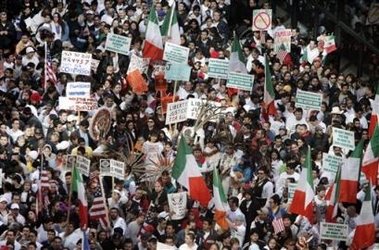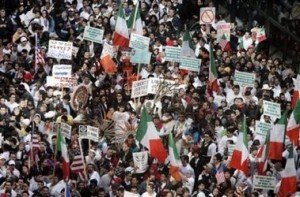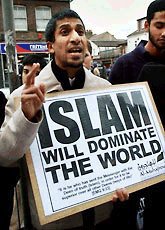The yanked article, as it turns out, starts off talking about exactly this. It then goes on to lay out the uncomfortable reality of what Muslims want, and how they’re going about getting it. This is required reading for all infidels, whether you live in England or not.
ENGLAND: The day is coming when British Muslims form a state within a state
By Alasdair Palmer
The Telegraph Group
February 19, 2006
For the past two weeks, Patrick Sookhdeo has been canvassing the opinions of Muslim clerics in Britain on the row over the cartoons featuring images of Mohammed that were first published in Denmark and then reprinted in several other European countries.
“They think they have won the debate,” he says with a sigh. “They believe that the British Government has capitulated to them, because it feared the consequences if it did not.
“The cartoons, you see, have not been published in this country, and the Government has been very critical of those countries in which they were published. To many of the Islamic clerics, that’s a clear victory.
“It’s confirmation of what they believe to be a familiar pattern: if spokesmen for British Muslims threaten what they call ‘adverse consequences’ – violence to the rest of us – then the British Government will cave in. I think it is a very dangerous precedent.”
Dr Sookhdeo adds that he believes that “in a decade, you will see parts of English cities which are controlled by Muslim clerics and which follow, not the common law, but aspects of Muslim sharia law.
“It is already starting to happen – and unless the Government changes the way it treats the so-called leaders of the Islamic community, it will continue.”
For someone with such strong and uncompromising views, Dr Sookhdeo is a surprisingly gentle and easy-going man. He speaks with authority on Islam, as it was his first faith: he was brought up as a Muslim in Guyana, the only English colony in South America, and attended a madrassa there.
“But Islamic instruction was very different in the 1950s, when I was at school,” he says. “There was no talk of suicide bombing or indeed of violence of any kind. Islam was very peaceful.”
Dr Sookhdeo’s family emigrated to England when he was 10. In his early twenties, when he was at university, he converted to Christianity. “I had simply seen it as the white man’s religion, the religion of the colonialists and the oppressors – in a very similar way, in fact, to the way that many Muslims see Christianity today.
” Leaving Islam was not easy. According to the literal interpretation of the Koran, the punishment for apostasy is death – and it actually is punished by death in some Middle Eastern states. “It wasn’t quite like that here,” he says, “although it was traumatic in some ways.”
Dr Sookhdeo continued to study Islam, doing a PhD at London University on the religion. He is currently director of the Institute for the Study of Islam and Christianity. He also advises the Army on security issues related to Islam.
Several years ago, Dr Sookhdeo insisted that the next wave of radical Islam in Britain would involve suicide bombings in this country. His prediction was depressingly confirmed on 7/7 last year.
So his claim that, in the next decade, the Muslim community in Britain will not be integrated into mainstream British society, but will isolate itself to a much greater extent, carries weight behind it. Dr Sookhdeo has proved his prescience.
“The Government, and Tony Blair, the Prime Minister, are fundamentally deluded about the nature of Islam,” he insists. “Tony Blair unintentionally revealed his ignorance when he said, in an effort to conciliate Muslims, that he had ‘read through the Koran twice’ and that he kept it by his bedside.
“He thought he was saying something which showed how seriously he took Islam. But most Muslims thought it was a joke, if not an insult. Because, of course, every Muslim knows that you cannot read the Koran through from cover to cover and understand it.
The chapters are not written to be read in that way. Indeed, after the first chapter, the chapters of the Koran are ordered according to their length, not according to their content or chronology: the longest chapters are first, the shorter ones are at the end.
“You need to know which passage was revealed at what period and in what time in order to be able to understand it – you cannot simply read it from beginning to end and expect to learn anything at all.
“That is one reason why it takes so long to be able to read and understand the Koran: the meaning of any part of it depends on a knowledge of its context – a context that is not in the Koran itself.”
The Prime Minister’s ignorance of Islam, Dr Sookhdeo contends, is of a piece with his unsuccessful attempts to conciliate it. And it does indeed seem as if the Government’s policy towards radical Islam is based on the hope that if it makes concessions to its leaders, they will reciprocate and relations between fundamentalist Muslims and Tony Blair’s Government will then turn into something resembling an ecumenical prayer meeting.
Dr Sookhdeo nods in vigorous agreement with that. “Yes – and it is a very big mistake. Look at what happened in the 1990s. The security services knew about Abu Hamza and the preachers like him. They knew that London was becoming the centre for Islamic terrorists. The police knew. The Government knew. Yet nothing was done.
“The whole approach towards Muslim militants was based on appeasement. 7/7 proved that that approach does not work – yet it is still being followed. For example, there is a book, The Noble Koran: a New Rendering of its Meaning in English, which is openly available in Muslim bookshops.
“It calls for the killing of Jews and Christians, and it sets out a strategy for killing the infidels and for warfare against them. The Government has done nothing whatever to interfere with the sale of that book.
“Why not? Government ministers have promised to punish religious hatred, to criminalise the glorification of terrorism, yet they do nothing about this book, which blatantly does both.”
Perhaps the explanation is just that they do not take it seriously. “I fear that is exactly the problem,” says Dr Sookhdeo. “The trouble is that Tony Blair and other ministers see Islam through the prism of their own secular outlook.
They simply do not realise how seriously Muslims take their religion. Islamic clerics regard themselves as locked in mortal combat with secularism.
“For example, one of the fundamental notions of a secular society is the moral importance of freedom, of individual choice. But in Islam, choice is not allowable: there cannot be free choice about whether to choose or reject any of the fundamental aspects of the religion, because they are all divinely ordained. God has laid down the law, and man must obey.
‘Islamic clerics do not believe in a society in which Islam is one religion among others in a society ruled by basically non-religious laws. They believe it must be the dominant religion – and it is their aim to achieve this.
“That is why they do not believe in integration. In 1980, the Islamic Council of Europe laid out their strategy for the future – and the fundamental rule was never dilute your presence. That is to say, do not integrate.
“Rather, concentrate Muslim presence in a particular area until you are a majority in that area, so that the institutions of the local community come to reflect Islamic structures. The education system will be Islamic, the shops will serve only halal food, there will be no advertisements showing naked or semi-naked women, and so on.”
That plan, says Dr Sookhdeo, is being followed in Britain. “That is why you are seeing areas which are now almost totally Muslim. The next step will be pushing the Government to recognise sharia law for Muslim communities – which will be backed up by the claim that it is “racist” or “Islamophobic” or “violating the rights of Muslims” to deny them sharia law.
“There’s already a Sharia Law Council for the UK. The Government has already started making concessions: it has changed the law so that there are sharia-compliant mortgages and sharia pensions.
“Some Muslims are now pressing to be allowed four wives: they say it is part of their religion. They claim that not being allowed four wives is a denial of their religious liberty. There are Muslim men in Britain who marry and divorce three women, then marry a fourth time – and stay married, in sharia law, to all four.
“The more fundamentalist clerics think that it is only a matter of time before they will persuade the Government to concede on the issue of sharia law. Given the Government’s record of capitulating, you can see why they believe that.”
Dr Sookhdeo’s vision of a relentless battle between secular and Islamic Britain seems hard to reconcile with the co-operation that seems to mark the vast majority of the interactions between the two communities.
“Well, it isn’t me who says Islam is at war with secularisation,” he says. “That’s how Islamic clerics describe the situation.”
But isn’t it true that most Muslims who live in theocratic states want to get out of them as quickly as possible and live in a secular country such as Britain or America? And that most Muslims who come to Britain adopt the values of a liberal, democratic, tolerant society, rather than insisting on the inflexible rules of their religion?
“You have to distinguish between ordinary Muslims and their self-appointed leaders,” explains Dr Sookhdeo. “I agree that the best hope for our collective future is that the majority of Muslims who have grown up here have accepted the secular nature of the British state and society, the division between religion and politics, and the importance of allowing people to choose freely how they will live.
“But that is not how most of the clerics talk. And, more significantly, it is not how the ‘community leaders’ whom the Government has decided represent the Muslim community think either.
“Take, for example, Tariq Ramadan, whom the Government has appointed as an adviser because ministers think he is a ‘community leader’. Ramadan sounds, in public, very moderate. But in reality, he has some very extreme views. He attacks liberal Muslims as ‘Muslims without Islam’. He is affiliated to the violent and uncompromising Muslim Brotherhood.
“He calls the education in the state schools of the West ‘aggression against the Islamic personality of the child’. He has said that ‘the Muslim respects the laws of the country only if they do not contradict any Islamic principle’. He has added that ‘compromising on principles is a sign of fear and weakness’.”
So what’s the answer? What should the Government be doing? “First, it should try to engage with the real Muslim majority, not with the self-appointed ‘community leaders’ who don’t actually represent anyone: they have not been elected, and the vast majority of ordinary Muslims have nothing to do with them.
“Second, the Government should say no to faith-based schools, because they are a block to integration. There should be no compromise over education, or over English as the language of education. The policy of political multiculturalism should be reversed.
“The hope was that it would to ensure separate communities would soften at the edges and integrate. But the opposite has in fact happened: Islamic communities have hardened. There is much less integration than there was for the generation that arrived when I did. There will be much less in the future if the present trend continues.
“Finally, the Government should make it absolutely clear: we welcome diversity, we welcome different religions – but all of them have to accept the secular basis of British law and society. That is a non-negotiable condition of being here.
“If the Government does not do all of those things then I fear for the future, because Islamic communities within Britain will form a state within a state. Religion will occupy an ever-larger place in our collective political life. And, speaking as a religious man myself, I fear that outcome.”
http://www.opinion.telegraph.co.uk/news/main.jhtml?xml=/news/2006/02/19/nsharia219.xml Copyright of Telegraph Group Limited 2006.
 I have to admit Clooney has a certain je ne sais quoi. He is a gifted actor and I enjoy most of his work. Three Kings for instance. A great film in which the chemical weapons Saddam never had play a significant role. Anyway my fixation on Clooney has at least a little to do with his poster boy qualities. He symbolizes America in a way that makes his anti-American politics especially perplexing. How can a man living the American dream have such distaste for his home? How can someone so priviledged whine and complain as if he’s oppressed? How dare he pose as a rebel?
I have to admit Clooney has a certain je ne sais quoi. He is a gifted actor and I enjoy most of his work. Three Kings for instance. A great film in which the chemical weapons Saddam never had play a significant role. Anyway my fixation on Clooney has at least a little to do with his poster boy qualities. He symbolizes America in a way that makes his anti-American politics especially perplexing. How can a man living the American dream have such distaste for his home? How can someone so priviledged whine and complain as if he’s oppressed? How dare he pose as a rebel?



